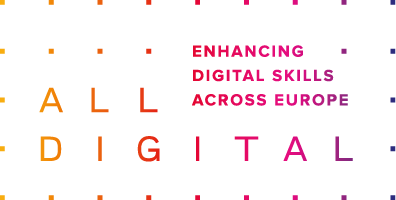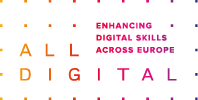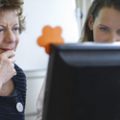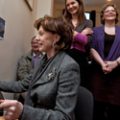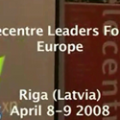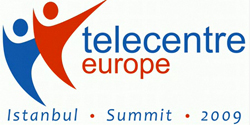
17 Nov Telecentre Europe Summit 2009
17 Nov, 2009
It brought together 90 telecentre network leaders from across the world. The event was managed by the Telecentre-Europe’s Steering Committee and Youth for Habitat, and was sponsored by Microsoft. The summit took forward the success of the Telecentre Leaders Forum, held in Riga in April 2008.
The summit provided a wonderful opportunity to discuss and share information and knowledge about European telecentre networks and other related themes. The programme included parallel workshops with open floor discussions, interaction and plenary sessions in which interesting presentations were made. In addition, the participants found a lot of time for networking during social events, like the welcome reception and the Bosporus boat tour.

The first day of the summit started with a very warm welcome from Telecentre-Europe’s Steering Committee. The session provided a brief overview of the European network’s background, challenges and outcomes. Afterwards, the participants were addressed by three keynote speakers: Akhtar Badshah, Senior Director, Community Affairs, Microsoft; Richard Fuchs, Country Director, International Development Research Centre, South East Asia Office, Singapore; and Paul Timmers, Head of eInclusion, European Commission. Florin Lupescu, Director, Directorate “ICT Addressing Societal Challenges”, European Commission Directorate General for Information Society and Media, also addressed the participants through a very short video speech.
On the first day, the workshops on Accessibility, Employability and Citizenship were organized twice during the day so that most of the participants got a chance to attend them. In the afternoon, the participants had a chance to share and listen to eInclusion best-practices across Europe during Euro Cafe presentations. Representatives from Learn More about ICT Network, Denmark; International Aid Network, Serbia; and Youth for Habitat, Turkey briefed about their respective organizations’ projects and activities. During the session, the audience witnessed grassroots implementation process interspersed with real and practical examples. To make the session more lively, the participants were given short question and answer break with speakers after their presentations.
The last session of the first day brought to attention the second round of staff exchanges that will be organized by Telecentre-Europe in the near future and introduced a couple of useful web-applications, namely thematic resources repository and members directory developed lately to increase the network’s efficiency. Telecentre-Europe’s Steering Committee wanted to launch these applications during the summit, taking advantage of the “face to face” meeting, when every new idea appeared to be clear and quite easy to share among the members too. It was also thought that the summit was an appropriate platform to begin a debate on this. It intended to make sure that members understand the real meaning and utility of the repository and the directory and the need of their contributions to make them relevant for their daily work once they are back home.
The first tool was built to collect good practices and to directly address staff issues in the context of telecentres. Tools were analysed before being presented on the platform and a description of their objectives and requirements was intended to develop an understanding about them. They are divided into five general themes, namely employability, accessibility, sustainability, capacity building and citizenship.
The second application launched at the Summit was the members’ directory, a database that contains information about networks operating in Europe. They are trying to collect information about as many networks as possible. Every user will be able to edit his/ her own information and only Telecentre-Europe members will be allowed access to it. The profile information and other knowledge about the networks will facilitate partnerships, exchanges and project collaboration across the continent. The day ended with a boat trip on Bosporus, one of the Turkish straits, where participants enjoyed great dinner, music, local drinks and a wonderful view of the city lights.
Speeches by Daniel Ben Horin, TechSoup Global and Ramazan Altinok, Head of e-Government Advisory Group from Turkish Prime Ministry were delivered on the second day of the summit. Shortly after the plenary session, Capacity building and Sustainability workshops were also held. Melissa Pailthorp, Microsoft Learning Resources – MS Learning; Florencio Ceballos, Telecentre.org; Daniel Ben Horin, TechSoup Global and Miguel Raimilla, OneRoof discussed various tools and services that could be advantageous for telecentres and telecentre people.
In afternoon, the impact analysis session explained the rationale behind eInclusion. Paul Timmers and Gabriel Rissola, DOT, Spain explained different case studies and various methods to analyse the work done to turn any project into really relevant activity day by day. This session was followed by another Euro Cafe with two presentations. Florencio Ceballos moderated the final talk show with three guests, namely Tess Camba, telecentre.org 2.0- PhilCecNet; Rufina Fernandes, NASSCOM Foundation; and Hansin Dogan, Programme Manager, United Nations Development Programme (UNDP). The summit concluded with a slew of ideas from the Telecentre-Europe Steering Committee to take the next steps.
The summit proved to be very inspiring for everybody. More than 80 people stayed together and shared their ideas, concepts, methods, etc. The Steering Committee and collaborators are really proud of the summit outcomes and conclusions. Feedbacks were also collected to improve the organisation of future summits and serve better the members next time.
